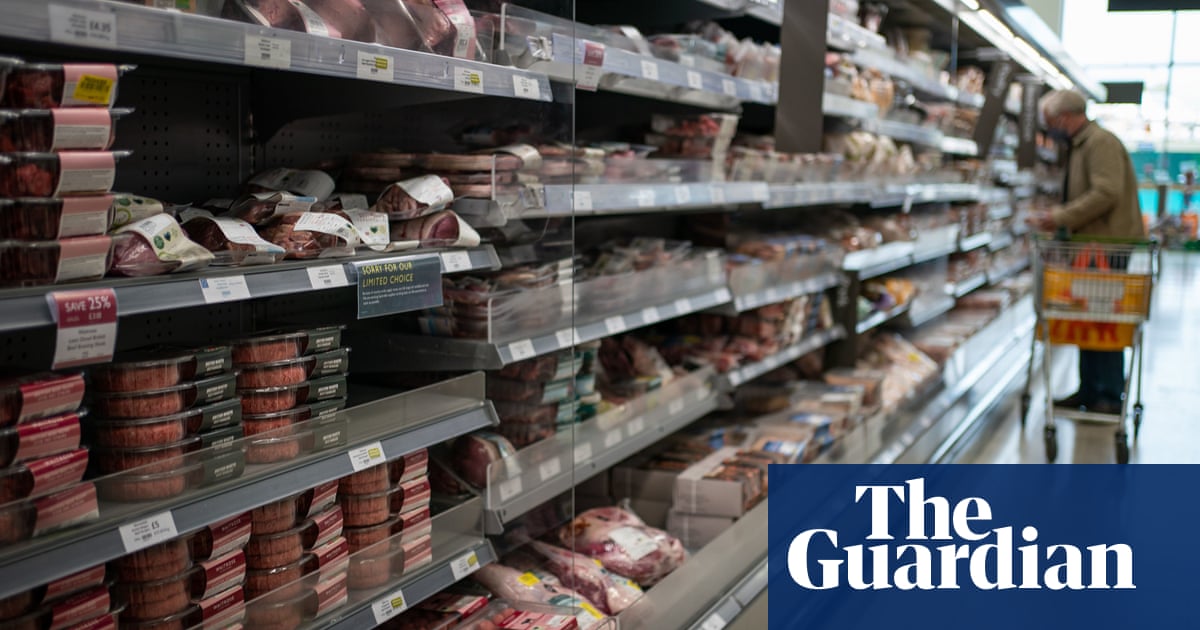
People in the UK consumed less meat last year than at any point since records began in the 1970s, in a trend driven by the cost of living crisis, the continued impact of Covid and broader lifestyle changes.
Data released by the government showed that Britons ate less meat at home in the year to March 2022 than at any point since 1974, with the average person eating 854g (1.88lbs) a week. That was down from 976g the previous year and 949g in 2019-20, before the Covid-19 pandemic.
It marks a 14% decrease since 2012 – with carcass meat consumption including beef, pork and lamb falling by 26% and chicken and other meat products falling by 11% in the past decade.
The data also shows that there was a drop in Britons’ takeaway meat consumption in 2021-22, with people eating fewer burgers, kebabs and meat pies in terms of grams per capita than at any point since the 1980s.
In 2021-22, meat bought from takeaways stood at 27g per person a week, less than half of what it was in 2012. However, these figures are likely to have been heavily influenced by the effects of the Covid-19 pandemic.
The period covered by the data also overlaps with the early stages of the cost of living crisis, driven by the price shocks caused by Russia’s invasion of Ukraine.
The consumption of fish also fell over the year, with the average person reporting eating 135g – down from 148g before the pandemic. Minced beef was at its lowest level of consumption since 1999.
In general, food purchases have come back down to pre-pandemic levels after being elevated during the previous year due to households buying more to eat at home rather than eating out.
People are also moving to cheaper cuts of meat. The average Briton ate 13g of more expensive beef steak in 2021-22 – down from 21g the year before. Meanwhile, people ate 16g of cheaper beef steak, down from 20g.
The price of a beef steak rose 10% over the year, while the cost of a whole chicken was up 9%, separate figures from the Office for National Statistics show.
They show the highest 10% of earners were eating 10% less meat a week than a decade ago, while the poorest 10% were eating 19% less.
A study published by researchers at Oxford University earlier this year found that eating a vegan diet resulted in a 75% reduction in climate-heating emissions, water pollution and land use than diets in which more than 100g of meat a day was consumed.
In 2020, the Climate Change Committee (CCC) suggested a target for a 35% reduction in meat per person by 2050 to help reach net zero targets. However, the CCC did not suggest taxing meat as a way to reduce consumption – something that the UK prime minister, Rishi Sunak, claimed was a “heavy-handed measure” the government was “stopping” last month.
after newsletter promotion
Dr Mike Clark, a senior research associate in food at the Oxford Smith school, said the reduction in meat consumption was not moving quickly enough if put against recommended UK guidelines.
He said: “The UK national food strategy recommends a 30% reduction in meat consumption by 2032, while the Climate Change Committee recommends a 35% reduction in meat consumption.
“Meeting either of the above targets requires a doubling in the rate of meat reduction compared with the rate from the last 10 years.”
Previous research by Cristina Stewart, a health behaviours researcher at the University of Oxford, found that meat consumption had fallen 17% between 2008-09 and 2018-19. Since then, Department for Environment, Food and Rural Affairs figures show a large drop in the year to March 2022.
Clark said that Covid-19, the war in Ukraine, and the cost of living crisis could be behind this recent drop. He said: “This seems to indicate that meat reduction may not actually be a trend over the past 10 years, but may rather be a one-year event in 2022.”
